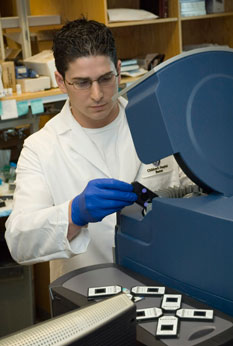Basic science research | Overview
Basic science or research laboratory breakthroughs form the foundation for new treatments and therapies. Therefore, fundamental to the mission of the Boston Children's Hospital Brain Center is a commitment to support the very best basic research into the developing nervous system and its disorders—as well as its direct translation through applied and clinical research into new therapies. Our many researchers focusing on the developing nervous system—and the conditions that affect it—are part of several programs at Children's.
Neuroscience research
 The Neurobiology Program at Children's is the largest basic neuroscience research enterprise in any United States hospital. Researchers in the program investigate the fundamental mechanisms that regulate nervous system development from a genetic, molecular, cellular and systems perspective, with the goal of applying this knowledge to the understanding and novel treatment of disorders of the nervous system that affect children.
The Neurobiology Program at Children's is the largest basic neuroscience research enterprise in any United States hospital. Researchers in the program investigate the fundamental mechanisms that regulate nervous system development from a genetic, molecular, cellular and systems perspective, with the goal of applying this knowledge to the understanding and novel treatment of disorders of the nervous system that affect children.
The work of our basic science researchers is helping doctors understand how and why brain disorders occur, how well current therapies are working and what new treatments might be possible.
Our program has very close links with the Neurobiology Department at Harvard Medical School and has many research collaborations within Children’s, as well as at other major research institutions and throughout the biotechnical industry.
The activities of the Neurobiology Program include:
- studying how the nervous system develops
- identifying how genetic or environmental disturbances can disrupt function to cause disease
Investigators use stem cell technology to transform skin biopsy material from patients into particular brain neurons to:
- model the patient’s disease
- screen for new drugs
- promote regeneration
Researchers also study how the nervous system becomes correctly connected at critical periods and—if this connection does not occur—demonstrate why neural and psychiatric disorders can develop.
Our research investigators carefully analyze details of how the brain develops, working hand in hand with clinician-scientists—ensuring that new discoveries can rapidly be applied to the creation of:
- new diagnostic tools
- new treatments
- new strategies for preventing disease and optimizing recovery from injuries
Children’s Neurobiology Program is committed to transforming therapy by investing in the best possible basic science research base. Understanding the brain is the first step for successfully treating its disorders; for this to work well, an interactive research, translational and clinical environment is required … something the Brain Center at Children’s uniquely provides.
